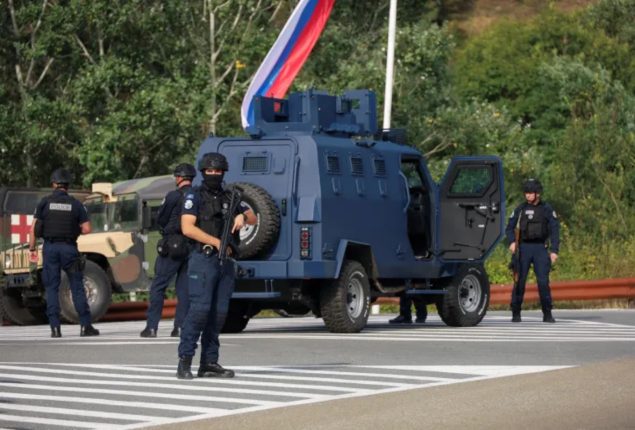Kosovo Bridge Divers Overcome Fear in Annual Competition
In a breathtaking display of courage and skill, participants took a plunge...

Kosovo files charges against 45 people for deadly Serb gunmen attack
On Wednesday, Kosovo prosecutors charged 45 people over a gunfight that followed an incursion by heavily armed Serb gunmen last year, as tensions between Serbia and its former breakaway province escalate. In September, a shootout in the village of Banjska resulted in the deaths of a Kosovo policeman and three Serb gunmen. Kosovo has accused Serbia of involvement, but Belgrade has denied it.
Among those charged in absentia is Milan Radoicic, a politician and wealthy businessman linked to Serbia’s ruling Populist Party and President Aleksandar Vucic. Prosecutor Naim Abazi stated that Radoicic is considered the leader of the group, playing a crucial role in coordinating and executing the criminal activity.
Last year, Serbia briefly detained Radoicic after he fled back into Serbia on suspicion of criminal conspiracy, unlawful possession of weapons and explosives, and grave acts against public safety. Radoicic denied the charges but previously admitted to being part of the paramilitary group involved in the gunfight.
Radoicic has also faced US and British sanctions for his alleged financial criminal activity. Serbia has claimed that Radoicic and his group acted independently. The 45 people face charges including violation of the constitutional and legal order, terrorism, funding terrorism, and money laundering, with a maximum sentence of life in prison.
Abazi called the case the “most complex they have ever had,” noting that they closely cooperated with international institutions, the European Union, and the United States to build strong charges. EU and US officials have demanded that Serbia bring the perpetrators to justice.
Brussels and Washington are pressing both sides to implement the agreements that Vucic and Kosovo Prime Minister Albin Kurti reached in February and March last year. These agreements include Kosovo’s commitment to establish an Association of Serb-majority municipalities. Serbia is also expected to deliver on the de facto recognition of Kosovo, which Belgrade still considers its province.
The US and EU have urged Kosovo to avoid unilateral actions, such as closing the so-called parallel state institutions in the Serb-majority north, fully reopening a bridge in the flashpoint city of Mitrovica, and closing six branches of a Serbia-licensed bank earlier this year. Following last year’s tense moments, NATO-led international peacekeepers known as KFOR have increased their presence in Kosovo.
Until NATO’s 78-day bombing campaign in 1999 ended the war between Serbian government forces and ethnic Albanian separatists, Kosovo was a Serbian province. The conflict, which resulted in about 13,000 deaths—mainly ethnic Albanians—pushed Serbian forces out of Kosovo. Kosovo proclaimed its independence in 2008.
Catch all the International News, Breaking News Event and Latest News Updates on The BOL News
Download The BOL News App to get the Daily News Update & Follow us on Google News.